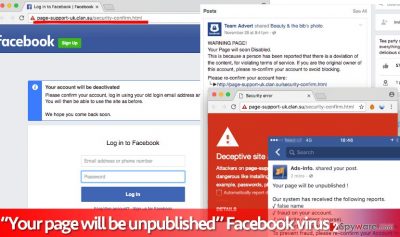“Your page will be unpublished” Facebook virus (Tutorial)
“Your page will be unpublished” Facebook virus Removal Guide
What is “Your page will be unpublished” Facebook virus?
“Your page will be unpublished” Facebook virus grabs login details to hack your social media account
“Your page will be unpublished” virus is a new type of scam that circulates on Facebook nowadays. It is tough to identify this scam because it uses a quite creative way to force victims to provide their login details to hackers. First of all, criminals create fake Facebook pages such as Ads-Info., Team Advert, Ads Department Social, Advert Indo, Advert Solution, and similar. Then they use these pages to repost content shared by individuals or pages that belong to businesses, stating that “Your page will be unpublished” because “your account has been reported by others.” Other versions of this virus claim that “Your page will soon disabled.” These pages state that the owner of a Facebook page has to quickly verify account information to avoid blocking. You can see an example of the deceptive post below.
Your page will be unpublished!
Our system has received the following reports.
√ false name
√ fraud on your account.
√ using other people’s images and obscene images.
√ you write coarse content.
To prevent fraud, please reconfirm your Account to avoid blocking here:
☞ [phishing site]
We reserve to close your account if you are found guilty or not verified within the period that we specify. And your account will be permanently disabled.
Thanks for your understanding,
Risk Management
Of course, these phony messages point to phishing websites that ask the victim to enter Facebook login details. Currently, these domains are known to be involved in “Your page will be unpublished” scam campaign:
- hxxp://wk-setting-page.hol.es/,
- hxxp://pagerecoverysupport-001.esy.es/,
- hxxp://maintenance-adverts-inf02.esy.es/help-info.Htm,
- hxxp://support-recoverpage-info.esy.es/reconfirm.htm.

There are dozens of other phishing websites that pretend to be the real Facebook login page. Do not fall for criminals’ tricks! The main sign that indicates that you landed on a phishing website is the suspicious URL. Real Facebook pages start with hxxp://facebook.com, and not some shady and complex-looking lines. If you provided your login details on such phishing sites and clicked “Submit,” your login details were sent directly to fraudsters who seek to hack your account. If you did so, change your password immediately (if you still can), report the fake Facebook page that convinced you to visit such phishing web page, and begin account recovery procedure immediately. If you can access your account, but your friends complain that you send suspicious links and messages to them that you have never actually composed, we highly recommend you to scan your device using a compatible anti-malware program/mobile application. We suggest using FortectIntego, SpyHunter 5Combo Cleaner, or Malwarebytes. In the meantime, we can only hope that Facebook authorities will quickly end this scam campaign and remove “Your page will be unpublished” Facebook virus posts from the social network.
Things you can do to avoid fraud
First of all, you need to be skeptical about such messages and not believe what they say before checking if they actually come from a reliable source. If you dig a bit deeper, you will discover that these pages have quite a lot likes, and contain photo albums that likely belong to individual Facebook users or business pages rather than to Facebook. You might encounter private photo albums, and such signs clearly indicate that there is no way such Facebook page could be controlled by the social media platform staff. The 2-spyware team assumes that “Your page will be unpublished” hackers steal accounts to hack legitimate FB pages to convert them into rogue ones and use them to scam people. Please use your common sense and do not agree to provide your personal information to anyone unless you are 100% sure that it is safe to do it. Before entering your personal information to one or another site, check if its URL is the real one.
How to remove “Your page will be unpublished” virus?
To remove “Your page will be unpublished” virus and protect your account, you should report the scam page to Facebook and, if it is still possible, change your Facebook password. If you cannot change your password anymore, start recovering your account with the help of “report compromised account” form. After you complete “Your page will be unpublished” removal and make sure your account is safe again, see this post to learn more about Facebook viruses.
How to prevent from getting malware
Stream videos without limitations, no matter where you are
There are multiple parties that could find out almost anything about you by checking your online activity. While this is highly unlikely, advertisers and tech companies are constantly tracking you online. The first step to privacy should be a secure browser that focuses on tracker reduction to a minimum.
Even if you employ a secure browser, you will not be able to access websites that are restricted due to local government laws or other reasons. In other words, you may not be able to stream Disney+ or US-based Netflix in some countries. To bypass these restrictions, you can employ a powerful Private Internet Access VPN, which provides dedicated servers for torrenting and streaming, not slowing you down in the process.
Data backups are important – recover your lost files
Ransomware is one of the biggest threats to personal data. Once it is executed on a machine, it launches a sophisticated encryption algorithm that locks all your files, although it does not destroy them. The most common misconception is that anti-malware software can return files to their previous states. This is not true, however, and data remains locked after the malicious payload is deleted.
While regular data backups are the only secure method to recover your files after a ransomware attack, tools such as Data Recovery Pro can also be effective and restore at least some of your lost data.
